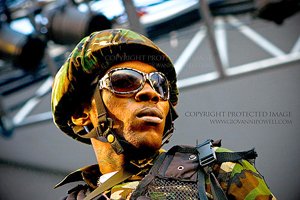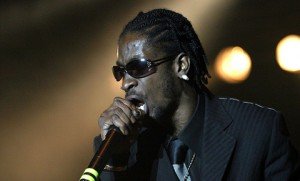 The words are quickly becoming the most prominent graffiti across the island. ‘Gaza’ and ‘Gully’ can be seen scribbled almost everywhere. In most garrisons they are as common as the Jamaica Labour Party (JLP) and People’s National Party (PNP) signs. And, like the political impact, the ‘Gaza/Gully’ feud has the potential to be as socially and psychologically imprisoning on its followers. The dancehall cliques are tied to the two most popular deejays – Adidja ‘Vybz Kartel’ Palmer (Gaza) and David ‘Mavado’ Brooks (Gully).
The words are quickly becoming the most prominent graffiti across the island. ‘Gaza’ and ‘Gully’ can be seen scribbled almost everywhere. In most garrisons they are as common as the Jamaica Labour Party (JLP) and People’s National Party (PNP) signs. And, like the political impact, the ‘Gaza/Gully’ feud has the potential to be as socially and psychologically imprisoning on its followers. The dancehall cliques are tied to the two most popular deejays – Adidja ‘Vybz Kartel’ Palmer (Gaza) and David ‘Mavado’ Brooks (Gully).
The names represent the area of their residence and home of their fan base. ‘Gaza’ is a section of the Waterford housing scheme in Portmore where Vybz Kartel grew up and lived for many years. ‘Gully’ represents the actual gully which dissects Mavado’s childhood community of Cassava Piece in St Andrew. But in the last year, they have come to mean much more. Following the highly publicised lyrical clash between Mavado and Vybz Kartel at Sting in December, a clannish divide has been created in segments of the society as fans latch on to their favourite artiste. Other deejays and sound system operators have also been choosing sides, deepening the divide and adding potency to the tense relationship between the two factions.
Anthropologist of social violence, Dr Herbert Gayle, believes that the majority of the ‘Gaza’ and ‘Gully’ supporters who use violence to show their allegiance are victims of inadequate social development. Gayle, who lectures at the University of West Indies, Mona, told The Sunday Gleaner that this behaviour will continue until there are proper infrastructure in these rigid inner-city communities to promote social development. “Some of these communities have no social institutions – no 4-H clubs, no craft centre, no trading centre, no nothing. So the issue with these young people is really a matter of identity,” Gayle said.
“All human beings have a need to belong. The poorer you are and the scarcer the resources (such as social development centres) is the more competitive and combative the war is,” he added. Gayle opined that the dancehall feud is worse than the political one. “There is nothing to gain physically, or nobody gets paid to be a ‘Gaza’ or ‘Gully’ supporter. It, in fact, is even worse than politics, because at least politicians would give these kids a hundred dollars and stuff,” he said.
MUSIC HURTS
 When music hits, apparently, you do feel pain. In last Tuesday’s STAR there was a report of a Canadian couple who were physically abused because they were at a ‘Gaza’ event and playing a Mavado song in their car.
When music hits, apparently, you do feel pain. In last Tuesday’s STAR there was a report of a Canadian couple who were physically abused because they were at a ‘Gaza’ event and playing a Mavado song in their car.
Vybz Kartel responded by saying he cannot claim responsibility for every ‘Gaza’ fan that takes music too far.
There were similar reports of violent clashes following the hotly disputed lyrical battle at Sting. Selectors Jigsy, Razz and Biggy and Rolex were also allegedly abused by supporters of Vybz Kartel over their music selection.
Psychologist Dr Leahcim Semaj believes the society is bearing the fruit of the seeds sown by Mavado and Vybz Kartel through their music, and it has now grown beyond their control.
“The ‘Gaza’ or ‘Gully’ affiliation has gone beyond frightening. Music is something not to be played with. It is one of the most powerful tools that influence society,” Dr Semaj told The Sunday Gleaner.
Semaj said music leaves an indelible impact on its listeners that affects them emotionally and psychologically, which can influence their actions. He said this is being manifested in the ‘Gaza’ and ‘Gully’ supporters.
“Music is something special. It’s universal and it is able to communicate with the human psyche,” he said.
Gaza is an Islamic city in the Middle Eastern country of Palestine. For centuries it has been a hotbed of violence and has been ruled by several world powers, from the Egyptians to the Romans.
In recent years, Israel and Palestine have had numerous violent clashes in that territory. In a 22-day battle between Israel and Palestine’s militant government, Hamas, in December 2008 and January of this year, 1,400 Palestinians were killed, 5,400 injured, 22,000 buildings destroyed and damage totalled almost US$2 billion.
The local ‘Gaza’ is following a trend of several inner-city communities that have adopted the names of war zones as a reflection of their community, such as ‘Tel Aviv’ in central Kingston and ‘Angola’ in Arnett Gardens.
The word Gaza derives from the Canaanite/Hebrew root for strong. At Reggae Sumfest in July, Vybz Kartel hinted at the etymology of Gaza when he said he uses it to represent his dancehall clique, Portmore Empire.
However, the reality is that its introduction in the dancehall circles has taken on a whole new meaning for some fans – one of intolerance for anyone who says otherwise.
Vybz Kartel told The Sunday Gleaner that his differences with Mavado remains musical. He, however, doesn’t believe the impact that the ‘Gaza’ or ‘Gully’ contention has on society is more damaging than those of other sectors of society, such as politics and religion.
“Gaza/Gully is just a musical rivalry between the barber (Mavado) and I, and I think the garrison understands that this is only entertainment. The only impact it has is that it brings about discussion and debates,” said Vybz Kartel.
“It (lyrical battle) sometimes brings heated verbal arguments and very rare instances of physical altercations, but no more than political or religious debates have done and will continue doing.”
Vybz Kartel sided with Dr Gayle’s theory of the detrimental lack of sufficient social tools.
“All these areas that these ‘Gaza’ or ‘Gully’ incidents occur are the same areas that were violent from day one. We in the garrison need direction and hope and a way out and society doesn’t provide the youths with constructive development tools, so music is all the garrison has,” he added.
Mavado pointed out that their music and message should not be singled out as a catalyst for violence.
“There is no work, high school youth a drop out of school, no social development in inner-city communities; a suffocation. A youth who is 14 has to stop going school because his/her mother can’t provide financially,” he said. “The country a devalue every day, things only getting worse, all these things are causing it. But through we (Mavado and Vybz Kartel) are doing the music, and they know we’re powerful as musicians, because we speak for the people, them (the authorities) try to put everything on us.”
PUBLIC FORUM
 Veteran deejay Bounty Killer, who in the ’90s was vilified for his plethora of ‘gun anthems’ and who gave Mavado and Vybz Kartel a start in the music business, said both deejays need to participate in a public forum.
Veteran deejay Bounty Killer, who in the ’90s was vilified for his plethora of ‘gun anthems’ and who gave Mavado and Vybz Kartel a start in the music business, said both deejays need to participate in a public forum.
“Nuff yutes out there under di influence of ‘Gully’ or ‘Gaza’,” he said.
“Me need unnuh (media) fi tek Mavado and Kartel and discuss dat. It nuh affi be di two a dem same time but dem fi do some public forum and mek di people dem si seh a nuh nutten serious, ’cause a nuh JLP or PNP again.”
Vybz Kartel said he would be willing to take part in such a forum.
“I have no problem being involved in anything that will reinforce in the minds of the Jamaican youth that tribalism, violence, illiteracy and intolerance to our fellow men’s views will not make us a better nation,” he said.
Youths in the inner city, who are most impacted by this conflict, have their own stories to tell. Twenty one-year-old Fitzgerald Benjamin, who lives in Norman Gardens, east Kingston, said the ‘Gaza’ or ‘Gully’ debate has been prominent ever since its emergence last summer.
“It’s been very dominant. Every youngster you see a pass is saying ‘Gaza’ or ‘Gully’. It’s escalating to something big and in my opinion I think the youths are taking it too seriously,” said Benjamin, who works in downtown Kingston as a customer service representative.
His sentiments were shared by Tiffany Perry, an 18-year-old dancehall music lover of a Penwood Road address in Waterhouse, St Andrew.
Perry, who attends the Excelsior Community College and is currently studying tourism, said, “I have seen fights break out over this, because one man a seh ‘Gully’ and the other a seh ‘Gaza’. It will only end in nothing but violence.
“Why people will die for nothing and at the end of the day you hear seh Mavado and Vybz Kartel are friends?”
part of dancehall culture
Joe Harris, 24, a maintenance clerk, believes persons shouldn’t be condemned for the artistes they choose to support. He, however, pointed out to The Sunday Gleaner that ‘clash’ is a part of dancehall culture, and persons should understand its context.
“This feud between artistes can’t stop. Artistes have to have conflicts so the business nice and exciting. Plus, the artistes use it (lyrical battles) to make money and sell their CDs, and to get the media’s  recognition. But it has to remain lyrical,” he said.
recognition. But it has to remain lyrical,” he said.
The ‘Gaza/Gully’ feud is one way the deterioration of the society is being manifested, argued Gayle. He believes Jamaica’s young men need special attention.
“The society has to take responsibility for its children. My stand is very simple: we can’t change ‘Gully’ or ‘Gaza’. When they leave something else is going to come. The one thing we need to do is care for our young men of our society,” he said.
Dancehall, a rebellious offspring of reggae, has always had a stigma attached to it.
From the onslaught of gun songs in the 1990s by deejays such as Ninja Man and Bounty Killer, to the lewd lyrics of Lady Saw and Shabba Ranks, and most recently the daggerin’ debate, the ‘Gully/Gaza’ phenomenon is just the latest dancehall episode to receive the brunt of criticism for societal ills.
While Mavado and Vybz Kartel have their differences, the ‘Gully Gad’ said their fans need to act responsibly.
“My message is that people shouldn’t make Mavado and Vybz Kartel determine their life, future and freedom. No man determines my life, so why would I want that for someone? I just want the youths who say ‘Gully’ or ‘Gaza’ to know that it’s just music,” said Mavado.
Via: Gleaner




